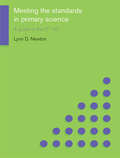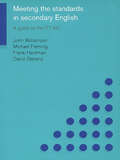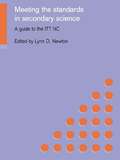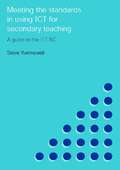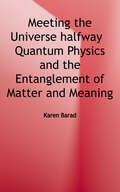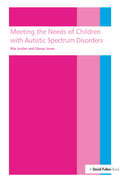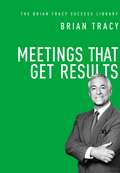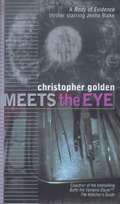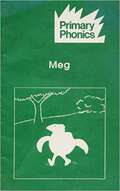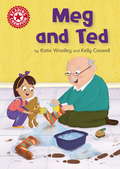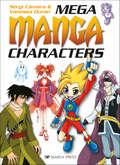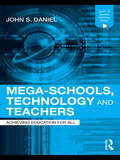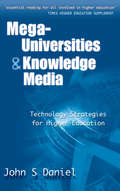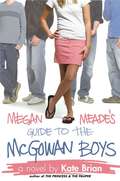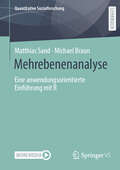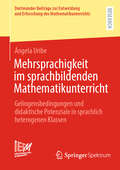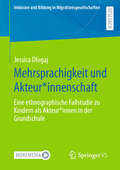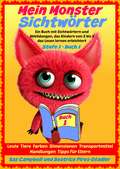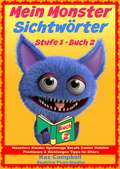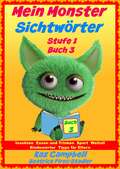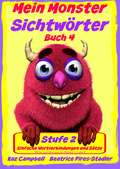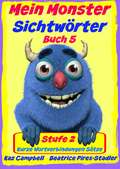- Table View
- List View
Meeting the Standards in Primary Science: A Guide to the ITT NC
by Lynn D. NewtonMeeting the Standards in Primary Science provides: primary science subject knowledge the pedagogical knowledge needed to teach science in primary schools support activities for work in schools and self-studyinformation on professional development for primary teachers. This practical, comprehensive and accessible book should prove invaluable for students on primary initial teacher training courses, PGCE students, lecturers on science education programmes and newly qualified primary teachers.
Meeting the Standards in Secondary English: A Guide to the ITT NC
by John Williamson Michael Fleming David Stevens Frank HardmanMeeting the Standards in Secondary English provides detailed subject knowledge, including the detailed pedagogical knowledge needed to teach English in secondary schools, support activities for work in schools and self-study and information on professional development for secondary schools.This practical, comprehensive and accessible book should prove invaluable for students on secondary initial teacher training courses, PGCE students, lecturers on English programmes and newly qualified secondary teachers.
Meeting the Standards in Secondary Science: A Guide to the ITT NC
by Lynn D. NewtonThis practical, comprehensive and accessible book will prove invaluable for students on secondary initial teacher training courses, PGCE students, lecturers on science education programmes and newly qualified secondary teachers.It provides: the pedagogical knowledge needed to teach science in secondary schools support activities for work in schools and self-study information on professional development for secondary teachers.
Meeting the Standards in Using ICT for Secondary Teaching: A Guide to the ITTNC
by Steve KennewellThis book explains how Information and Communications technology (ICT) has the potential to make a real improvement to teaching and learning across the curriculum in secondary schools. It illustrates a wide variety of ways in which ICT can be used to enhance learning, offering a fresh burst of inspiration for the busy secondary school teacher.The author takes a structured approach, ensuring that the reader is guided progressively through all the material in order to achieve the required standards for achieving Qualified Teacher Status, and also to continue their development in ICT to an advanced level. This book usefully:* analyzes all the common ICT tools and explains how teachers of each subject in the National Curriculum can exploit these tools for effective learning* explores how people can learn with ICT, how their skills develop, and how these skills can aid their learning* provides a framework for planning, analysing and evaluating teaching with ICT* offers a range of innovative tasks, resources and methods of assessment.
Meeting the Universe Halfway: Quantum Physics and the Entanglement of Matter and Meaning
by Karen BaradThis is an ambitious book with far-reaching implications for numerous fields in the natural sciences, social sciences, and humanities. In this volume, Karen Barad, theoretical physicist and feminist theorist, elaborates her theory of agential realism. Offering an account of the world as a whole rather than as composed of separate natural and social realms, agential realism is at once a new epistemology, ontology, and ethics. The starting point for Barad's analysis is the philosophical framework of quantum physicist Niels Bohr. Barad extends and partially revises Bohr's philosophical views in light of current scholarship in physics, science studies, and the philosophy of science as well as feminist, poststructuralist, and other critical social theories. In the process, she significantly reworks understandings of space, time, matter, causality, agency, subjectivity, and objectivity. In an agential realist account, the world is made of entanglements of "social" and "natural" agencies, where the distinction between the two emerges out of specific intra-actions. Intra-activity is an inexhaustible dynamism that configures and reconfigures relations of space-time-matter. In explaining intra-activity, Barad reveals questions about how nature and culture interact and change over time to be fundamentally misguided. And she reframes understanding of the nature of scientific and political practices and their "interrelationship." Thus she pays particular attention to the responsible practice of science, and she emphasizes changes in the understanding of political practices, critically reworking Judith Butler's influential theory of performativity. Finally, Barad uses agential realism to produce a new interpretation of quantum physics, demonstrating that agential realism is more than a means of reflecting on science; it can be used to actually do science.
Meeting the needs of children with autistic spectrum disorders
by Glenys Jones Rita JordanThis text is meant as a companion for students in teacher-training, newly-qualified teachers, or for anyone teaching children with autistic spectrum disorders for the first time in a mainstream setting. Using a case-study approach, the authors: help the teacher to identify the meaning behind pupils' actions and reactions; provide suggested responses via practical exercises and curriculum ideas; and provide signposts to other useful literature and list services and organisations which can further help the pupil. No prior knowledge of autistic spectrum disorders is required.
Meetings That Get Results (The Brian Tracy Success Library)
by Brian TracyLearn how to make meetings shorter, more effective, and more satisfying to everyone in attendance!In most workplaces today, meetings have become dreaded, meaningless, and at best, a necessary evil. Neither should be acceptable to management. All meetings should be powerful tools for solving problems, making decisions, exchanging ideas, and getting results fast.What is the secret to turning pointless into production? Based on years of experience consulting for companies around the world, Brian Tracy has learned firsthand what works in meetings and what doesn&’t.In Meetings That Get Results, Tracy will help you learn how to:Structure different types of meetingsEstablish meeting prioritiesSet an achievable agendaSummarize discussion points and decisionsGain agreement on action steps, assign responsibility, and set deadlinesMaximize the return on time invested, and much more!When you are leading a meeting, both your superiors and your subordinates are assessing your performance. This invaluable pocket-sized guide reveals simple, proven ideas for managers and other leaders to impress your coworkers with your improved skills.Meetings That Get Results shows you how to use structure, purpose, presentations, and more to make your performances more effective and compelling.
Meets the Eye (Body of Evidence #4)
by Christopher Golden"There's no such thing as zombies. Of course I know that. But I also know what I saw with my own eyes, and until I find out the truth of it, that's going to haunt me." Freshman year is supposed to be filled with new experiences, but Jenna Blake's not sure she's ready for all of the changes her life has gone through recently. She lost one close friend to a tragic crime, and two others are now becoming romantically involved. Jenna is further unsettled when a baffling new case presents itself at the medical examiner's office, where she works as an assistant. The Boston area is experiencing a crime wave that includes both major theft and murder. The problem is, each of the criminals is someone that Somerset Medical Center has declared legally dead -- and who has been buried. Jenna has to piece together an explanation for these "zombie crimes." She knows that there's more going on than meets the eye. The dead can't really rise from their graves -- or can they? One things for sure... she doesn't want to find out the hard way!
Meg and Ted: Independent Reading Red 2 (Reading Champion #366)
by Katie WoolleyThis story is part of Reading Champion, a series carefully linked to book bands to encourage independent reading skills, developed with Dr Sue Bodman and Glen Franklin of UCL Institute of Education (IOE)Meg likes to help - and she never goes anywhere without her trusted bear, Ted, who also likes to help!Reading Champion offers independent reading books for children to practise and reinforce their developing reading skills.Fantastic, original stories are accompanied by engaging artwork and a reading activity. Each book has been carefully graded so that it can be matched to a child's reading ability, encouraging reading for pleasure. Perfect for the 4-5 year old beginner reader or those reading book band red.
Mega Manga Characters
by Sergi CàmaraDo you want to learn how to draw manga characters from scratch? Then look no further! Aimed specifically at beginners, this book includes examples from the main genres of manga characters and will teach you how to draw different characters in distinct poses. Starting with simple exercises and gradually getting more complicated, there are sections covering Kodomo (child), Shonen (teenage boy), Shojo (teenage girl) and Seinen (youth) characters to practise.To help you along the way, there are clear step-by-step instructions, with 10 exercises for each genre. Friendly chibis also pop up every so often to offer tips and advice to keep in mind while you are drawing. Extensive advice on finishing techniques ranges from colouring by computer, using pen and ink, paintbrush, felt-tip pen and pencils, both in black and white and colour.For the best start to your manga-drawing journey, this book will inspire you to explore and improve your skills.
Mega-Schools, Technology and Teachers: Achieving Education for All (Open and Flexible Learning Series)
by Sir John DanielEducation for All (EFA) has been a top priority for governments and intergovernmental development agencies for the last twenty years. So far the global EFA movement has placed its principal focus on providing quality universal primary education (UPE) for all children by 2015. The latest addition to The Open and Flexible Learning series, this book addresses the new challenges created by both the successes and the failures of the UPE campaign. This book advocates new approaches for providing access to secondary education for today’s rapidly growing population of children and young adults and examines: the creation and expansion of Mega-Schools, which combine distance learning and community support and have a proven track record of increasing access at scale how to prepare the ten-million new teachers that are required to achieve Education for All by 2015 by focusing on classroom-based in-service training strategies for using technology to scale up distance education cost-effectively the creation of a twenty-first century educational ecosystem that integrates open schooling and teacher education with communities and their school systems successful examples of open schools and teacher education programmes operating at scale around the world. Readers will be delighted to find that Sir John Daniel, bestselling Routledge author of Mega Universities and Knowledge Media, delivers another insightful and practical book on educational technology. Mega-Schools, Technology and Teachers will be of interest to all who are concerned by the central educational challenge of our times: providing secondary education to tens of millions of young people around the world.
Mega-universities and Knowledge Media (Open And Distance Learning Ser.)
by Daniel, John (Vice Chancellor, Open University)A discussion of how the knowledge media can contribute to the renewal of universities, particularly through the development of distance education. It looks at universities which have risen to the challenges of cost and accessibility using technology.
Megan Meade's Guide to the McGowan Boys
by Kate BrianWhen she was nine, Megan Meade met a group of terrible, mean, Bitter, Popsicle-goo-covered boys, the sons of her father's friend-the McGowan boys. Now, seven years later, Megan's army doctor parents are shipping off to Korea and Megan is being sent to live with the little monsters, who are older now and quite different than she remembered them. Living in a house with seven boys will give Megan, who has never even been kissed, the perfect opportunity to learn everything there is to know about boys. And she'll send all her notes to her best friend, Tracy, in . . . Megan Meade's Guide to the McGowan Boys
Megha Computer class 7 - Nepal
by Ganga Prasad Pun Shivhari Acharya Basanta BanThis Accessible book named 'Megha Computer Class 7' has been developed by Action on Disability Rights And Development (ADRAD) in the collaboration with WIPO/ ABC, DAISY Consortium and Curriculum Development Center, Sanothimi, Nepal
Megha Moral and Value Education 1 - Nepal
by Ranjit Singh Swapna Chhetri KaurThis Accessible book has been developed by Action on Disability Rights And Development (ADRAD) in the collaboration with WIPO/ ABC, DAISY Consortium and Curriculum Development Center, Sanothimi, Nepal.
Mehrebenenanalyse: Eine anwendungsorientierte Einführung mit R (Quantitative Sozialforschung)
by Michael Braun Matthias SandDie Mehrebenenanalyse ist ein statistisches Verfahren, das verwendet wird, wenn Daten hierarchisch strukturiert sind, d.h. Einheiten auf dem Individualniveau zu Einheiten aus einem oder mehreren höheren Niveaus gehören (z.B. Schüler in Klassen in Schulen). Es handelt sich um eine spezielle Regressionsanalyse, mit der Abhängigkeiten und Variationen auf verschiedenen Ebenen analysiert werden können. Das Buch behandelt die Logik der Mehrebenenanalyse, ihre wichtigsten statistischen Grundlagen sowie ihre Umsetzung in der Statistikumgebung R. Die Modellierung der Effekte auf verschiedenen Ebenen wird Schritt für Schritt erläutert, wobei ein besonderes Augenmerk auf Modellvergleichen liegt. Zudem werden besondere Anwendungsfälle, etwa kreuz-klassifizierte oder longitudinale Daten, illustriert. Als Beispiel dienen Daten aus der interkulturell vergleichenden Forschung. Datensatz und ergänzende Materialien zu den Kapiteln sind auf der Produktseite des Buches auf SpringerLink verfügbar.
Mehrsprachigkeit im sprachbildenden Mathematikunterricht: Gelingensbedingungen und didaktische Potenziale in sprachlich heterogenen Klassen (Dortmunder Beiträge zur Entwicklung und Erforschung des Mathematikunterrichts #53)
by Ángela UribeIn einem verstehensorientierten sprachbildenden Mathematikunterricht wird Sprache als Denkwerkzeug und somit als Schlüssel zum konzeptuellen Verständnis verstanden. Vor diesem Hintergrund stellt sich die Frage nach der Rolle anderer Sprachen neben der Unterrichtssprache im Lehr-Lern-Prozess. Insbesondere in einer mehrsprachigen Gesellschaft – wie Deutschland – treffen im Unterricht diverse Sprachen aufeinander und die Lernenden bringen eine Vielzahl von Ressourcen als Teil ihrer sprachlichen Repertoires mit, die über die Unterrichtssprache hinausgehen. Diese mehrsprachigen Repertoires der Lernenden können gerade für die Bedeutungskonstruktion beim Aufbau von konzeptuellem Verständnis eine wertvolle Ressource darstellen. Das vorliegende Buch trägt dazu bei, den Einbezug dieser vielfältigen Repertoires im Mathematikunterricht in sprachlich heterogenen Regelklassen zu konkretisieren. Es bietet dabei sowohl unmittelbare Ansatzpunkte für die Praxis als auch eine solide Grundlage für zukünftige Untersuchungen, die darauf abzielen, den Mathematikunterricht in einer zunehmend mehrsprachigen Welt weiter zu verstehen und zu verbessern. Das Buch markiert einen bedeutenden Schritt vorwärts im Einbezug von Mehrsprachigkeit als Ressource im Mathematikunterricht und setzt damit ein starkes Signal für eine inklusive und weltoffene Didaktik.
Mehrsprachigkeit und Akteur*innenschaft: Eine ethnographische Fallstudie zu Kindern als Akteur*innen in der Grundschule (Inklusion und Bildung in Migrationsgesellschaften)
by Jessica DlugajAusgehend von dem Befund, dass migrationsbedingte Mehrsprachigkeit zwar ein zentrales Thema der Erziehungswissenschaft darstellt, aber gleichzeitig wenig über die konkrete sprachliche Praxis mehrsprachiger Kinder in der Schule bekannt ist, widmet sich diese Fallstudie den sprachlichen Praktiken und Aushandlungen von Kindern an einer Grundschule. Dabei wird auf Basis einer ethnographischen Herangehensweise und unter Hinzunahme eines praxistheoretischen Agency-Konzeptes gezeigt, unter welchen Bedingungen es zur sprachlichen Handlungsfähigkeit von Kindern kommt und wie differenziert sich die mehrsprachige Situation von Kindern im Kontext von Migration im Feld Schule gestaltet.
Mein Monster - Sichtwörter - Stufe 1 Buch 1 - Leute Tiere Farben Dimensionen Orte Verkehr
by Kaz Campbell Beatrice Pires-StadlerEin Buch mit Sichtwörtern und Abbildungen, die Kindern von 2 bis 5 das Lesen lernen erleichtern. In diesem Buch gibt es über 100 Seiten mit bunten und interessanten Abbildungen von Menschen, Tieren, Farben, Dimensionen, Orten, Transportmitteln und Handlungen und ihre entsprechenden Wörter. Dies ist das erste Buch in der Mein Monster lernt lesen Serie. Arbeiten Sie durch diese Bücher und helfen Sie Ihrem Kind dabei, lesen zu lernen und einen enormen Vorsprung zu gewinnen. Auf Stufe 1 (Einzelwörter und Abbildungen) gibt es 3 Sichtwörter-Bücher. Jedes Buch umfasst 7 verschiedene Bereiche. Die Bücher in der Lern lesen Serie sind alle nummeriert; beginnen Sie also mit Buch 1 und machen Sie dann mit den folgenden Büchern dieser Stufe weiter. Stufe 2 Bücher (auch 3 Bücher) enthalten auch Sichtwörter, aber Einzelwörter werden zu kurzen Wortverbindungen und einfachen Sätzen kombiniert. Ein Bild begleitet jede Wortverbindung und jeden Satz ... und erleichtert so Ihrem Kind das Lesen. Die Mein Monster lernt lesen Serie ist ideal, um Ihrem Kind das Lesen beizubringen. Dieses Buch enthält für Eltern auch eine Reihe von Tipps zum Lesen, die Ihnen und Ihrem Kind helfen werden.
Mein Monster - Sichtwörter - Stufe 1 Buch 2
by Kaz Campbell Beatrice Pires-StadlerSichtwörter zum Lesen lernen - Buch 2 für Erstleser. In Buch 2 gibt es über 100 Seiten mit bunten und interessanten Abbildungen von Haustieren, Kleidern, Spielzeugen, Berufen, Zahlen, Gefühlen und Positionen und ihre entsprechenden Wörter. Dies ist das zweite Buch in der Mein Monster lernt lesen Serie. Arbeiten Sie durch diese Bücher und helfen Sie Ihrem Kind dabei, lesen zu lernen und einen enormen Vorsprung zu gewinnen. Auf Stufe 1 (Einzelwörter und Abbildungen) gibt es 3 Sichtwörter-Bücher. Jedes Buch umfasst 7 verschiedene Bereiche. Die Bücher in der Lern lesen Serie sind alle nummeriert; beginnen Sie also mit Buch 1 und machen Sie dann mit den übrigen Büchern der Serie weiter. Stufe 2 Bücher (auch 3 Bücher) enthalten auch Sichtwörter, aber Einzelwörter werden zu kurzen Wortverbindungen und einfachen Sätzen kombiniert. Ein Bild begleitet jede Wortverbindung und jeden Satz ... und erleichtert so Ihrem Kind das Lesen.
Mein Monster - Sichtwörter - Stufe 1 Buch 3
by Kaz Campbell Beatrice Pires-StadlerBuch 3 für Erstleser mit Sichtwörtern zum Lesen lernen In Buch 3 gibt es über 100 Seiten mit bunten und interessanten Abbildungen zu den Themen Insekten, Gegenstände, Lebensmittel, Sportarten, Wetter und Weltall, sowie ihre entsprechenden Wörter und ein paar Verbindungswörter. Dies ist das dritte Buch in der Mein Monster lernt lesen Serie. Arbeiten Sie durch diese Bücher und helfen Sie Ihrem Kind dabei, lesen zu lernen und einen enormen Vorsprung zu gewinnen. Auf Stufe 1 (Einzelwörter und Abbildungen) gibt es 3 Sichtwörter-Bücher. Jedes Buch umfasst 7 verschiedene Bereiche. Die Bücher in der Lern lesen Serie sind alle nummeriert; beginnen Sie also mit Buch 1 und machen Sie dann weiter. Stufe 2 Bücher (auch 3 Bücher) enthalten auch Sichtwörter, aber Einzelwörter werden zu kurzen Wortverbindungen und einfachen Sätzen kombiniert. Ein Bild begleitet jede Wortverbindung und jeden Satz ... und erleichtert so Ihrem Kind das Lesen. Die Mein Monster lernt lesen Serie ist ideal, um Ihrem Kind das Lesen beizubringen. Dieses Buch enthält für Eltern auch eine Reihe von Tipps zum Lesen. Sie werden Ihnen und Ihrem Kind helfen.
Mein Monster - Sichtwörter - Stufe 2 Buch 4 - Wortverbindungen & einfache Sätze
by Kaz Campbell Beatrice Pires-StadlerSichtwörter zum Lesen lernen - Buch 4 für Erstleser Buch 4 kombiniert die Sichtwörter aus den Mein Monster lernt lesen Büchern 1, 2, und 3 (Stufe 1) zu kurzen Wortverbindungen und einfachen Sätzen. Eine Abbildung begleitet jede Seite und erleichtert so Ihrem Kind das Lesen. Arbeiten Sie durch diese Bücher und helfen Sie Ihrem Kind dabei, lesen zu lernen und einen enormen Vorsprung zu gewinnen.
Mein Monster - Sichtwörter - Stufe 2 Buch 5 - Kurze Wortverbindungen Sätze
by Kaz Campbell Beatrice Pires-StadlerSichtwörter zum Lesen lernen - Buch 5 für Erstleser Buch 5 kombiniert die Sichtwörter aus den Mein Monster lernt lesen Büchern 1, 2, und 3 (Stufe 1) zu kurzen Wortverbindungen und einfachen Sätzen. Eine Abbildung begleitet jede Seite und erleichtert so Ihrem Kind das Lesen. Arbeiten Sie durch diese Bücher und helfen Sie Ihrem Kind dabei, lesen zu lernen und einen enormen Vorsprung zu gewinnen. Es gibt in dieser Lern lesen Serie 6 Sichtwörter-Bücher. Sowohl auf Stufe 1 (Einzelwörter und Abbildungen) als auch auf Stufe 2 (Sichtwörter werden zu einfachen Sätzen kombiniert) gibt es drei Bücher. Die Bücher in der Lern lesen Serie sind alle nummeriert; beginnen Sie also mit Buch 1 und machen Sie dann weiter.
Mein Monster Weihnachtsgeschichten
by Kaz Campbell Sabrina Krien20 Geschichten lesen, Witze, Rätsel, Gutenachtgeschichten ... Für Kinder im Alter von 2 bis 6 Jahren. Großartig für Schlafenszeit und für Anfänger
